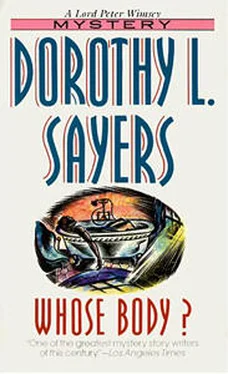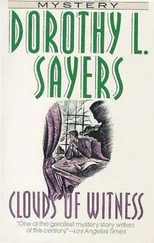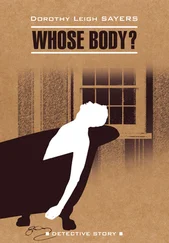Parker and Lord Peter were at 110 Piccadilly. Lord Peter was playing Bach and Parker was reading Origen when Sugg was announced.
«We've got our man, sir,» said he.
«Good God!» said Peter. «Alive?»
«We were just in time, my lord. We rang the bell and marched straight up past his man to the library. He was sitting there doing some writing. When we came in, he made a grab for his hypodermic, but we were too quick for him, my lord. We didn't mean to let him slip through our hands, having got so far. We searched him thoroughly and marched him off.»
«He is actually in gaol, then?»
«Oh, yes — safe enough — with two warders to see he doesn't make away with himself.»
«You surprise me, Inspector. Have a drink.»
«Thank you, my lord. I may say that I'm very grateful to you — this case was turning out a pretty bad egg for me. If I was rude to your lordship —»
«Oh, it's all right, Inspector,» said Lord Peter, hastily. «I don't see how you could possibly have worked it out. I had the good luck to know something about it from other sources.»
«That's what Freke says.» Already the great surgeon was a common criminal in the inspector's eyes — a mere surname. «He was writing a full confession when we got hold of him, addressed to your lordship. The police will have to have it, of course, but seeing it's written for you, I brought it along for you to see first. Here it is.»
He handed Lord Peter a bulky document.
«Thanks,» said Peter. «Like to hear it, Charles?»
«Rather.»
Accordingly Lord Peter read it aloud.
Dear Lord Peter — When I was a young man I used to play chess with an old friend of my father's. He was a very bad, and a very slow, player, and he could never see when a checkmate was inevitable, but insisted on playing every move out. I never had any patience with that kind of attitude, and I will freely admit now that the game is yours. I must either stay at home and be hanged or escape abroad and live in an idle and insecure obscurity. I prefer to acknowledge defeat.
If you have read my book on «Criminal Lunacy,» you will remember that I wrote: «In the majority of cases, the criminal betrays himself by some abnormality attendant upon this pathological condition of the nervous tissues. His mental instability shows itself in various forms: an overweening vanity, leading him to brag of his achievement; a disproportionate sense of the importance of the offence, resulting from the hallucination of religion, and driving him to confession; egomania, producing the sense of horror or conviction of sin, and driving him to headlong flight without covering his tracks; a reckless confidence, resulting in the neglect of the most ordinary precautions, as in the case of Henry Wainwright, who left a boy in charge of the murdered woman's remains while he went to call a cab, or on the other hand, a nervous distrust of apperceptions in the past, causing him to revisit the scene of the crime to assure himself that all traces have been as safely removed as his own judgment knows them to be . I will not hesitate to assert that a perfectly sane man, not intimidated by religious or other delusions, could always render himself perfectly secure from detection, provided, that is, that the crime were sufficiently premeditated and that he were not pressed for time or thrown out in his calculations by purely fortuitous coincidence.»
You know as well as I do, how far I have made this assertion good in practice. The two accidents which betrayed me, I could not by any possibility have foreseen. The first was the chance recognition of Levy by the girl in the Battersea Park Road, which suggested a connection between the two problems. The second was that Thipps should have arranged to go down to Denver on the Tuesday morning, thus enabling your mother to get word of the matter through to you before the body was removed by the police and to suggest a motive for the murder out of what she knew of my previous personal history. If I had been able to destroy these two accidentally forged links of circumstance, I will venture to say that you would never have so much as suspected me, still less obtained sufficient evidence to convict.
Of all human emotions, except perhaps those of hunger and fear, the sexual appetite produces the most violent and, under some circumstances, the most persistent reactions; I think, however, I am right in saying that at the time when I wrote my book, my original sensual impulse to kill Sir Reuben Levy had already become profoundly modified by my habits of thought. To the animal lust to slay and the primitive human desire for revenge, there was added the rational intention of substantiating my own theories for the satisfaction of myself and the world. If all had turned out as I had planned, I should have deposited a sealed account of my experiment with the Bank of England, instructing my executors to publish it after my death. Now that accident has spoiled the completeness of my demonstration, I entrust the account to you, whom it cannot fail to interest, with the request that you will make it known among scientific men, in justice to my professional reputation.
The really essential factors of success in any undertaking are money and opportunity, and as a rule, the man who can make the first can make the second. During my early career, though I was fairly well-off, I had not absolute command of circumstance. Accordingly I devoted myself to my profession, and contented myself with keeping up a friendly connection with Reuben Levy and his family. This enabled me to remain in touch with his fortunes and interests, so that, when the moment for action should arrive, I might know what weapons to use.
Meanwhile, I carefully studied criminology in fiction and fact — my work on «Criminal Lunacy» was a side-product of this activity — and saw how, in every murder, the real crux of the problem was the disposal of the body. As a doctor, the means of death were always ready to my hand, and I was not likely to make any error in that connection. Nor was I likely to betray myself on account of any illusory sense of wrongdoing. The sole difficulty would be that of destroying all connection between my personality and that of the corpse. You will remember that Michael Finsbury, in Stevenson's entertaining romance, observes: «What hangs people is the unfortunate circumstance of guilt.» It became clear to me that the mere leaving about of a superfluous corpse could convict nobody, provided that nobody was guilty in connection with that particular corpse . Thus the idea of substituting the one body for the other was early arrived at, though it was not till I obtained the practical direction of St. Luke's Hospital that I found myself perfectly unfettered in the choice and handling of dead bodies. From this period on, I kept a careful watch on all the material brought in for dissection.
My opportunity did not present itself until the week before Sir Reuben's disappearance, when the medical officer at the Chelsea workhouse sent word to me that an unknown vagrant had been injured that morning by the fall of a piece of scaffolding, and was exhibiting some very interesting nervous and cerebral reactions. I went round and saw the case, and was immediately struck by the man's strong superficial resemblance to Sir Reuben. He had been heavily struck on the back of the neck, dislocating the fourth and fifth cervical vertebr? and heavily bruising the spinal cord. It seemed highly unlikely that he could ever recover, either mentally or physically, and in any case there appeared to me to be no object in indefinitely prolonging so unprofitable an existence. He had obviously been able to support life until recently, as he was fairly well nourished, but the state of his feet and clothing showed that he was unemployed, and under present conditions he was likely to remain so. I decided that he would suit my purpose very well, and immediately put in train certain transactions in the City which I had already sketched out in my own mind. In the meantime, the reactions mentioned by the workhouse doctor were interesting, and I made careful studies of them, and arranged for the delivery of the body to the hospital when I should have completed my preparations.
Читать дальше












